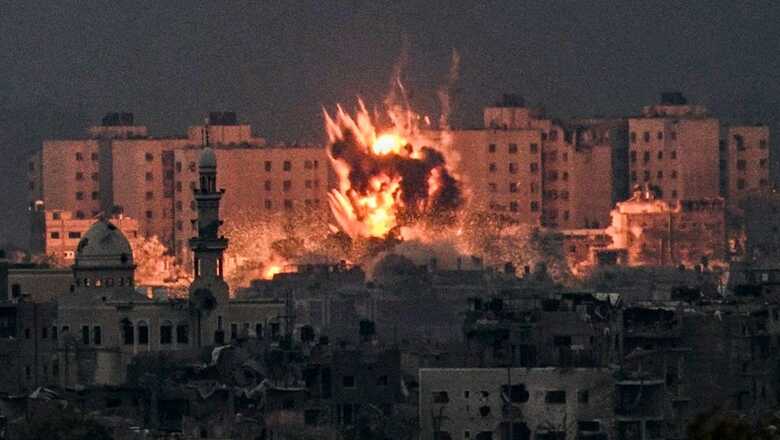
views
Strategic independence has been the key to Bharat’s foreign policy formulation while engaging with global powers. And furthering Bharat’s offensive and defensive interests is a primacy to this policy. Globally, zero tolerance for expansionist, jingoistic political thought and rejecting every form of terror irrespective of caste, creed, gender, region, religion, faith and colour is something Bharat feels strongly about.
The concept of ‘Vasudhaiva Kutumbakam’ – the entire humanity as one big global family – has been the cornerstone of the Narendra Modi government’s engagement internationally in the last nine years.
These three basic tenets of foreign policy worked reasonably well when Bharat stayed away from joining the pro or anti-Russian fronts. Instead of joining the NATO forces blindly or going Russia’s way whole hog, Bharat espoused its own line.
Strategic independence in thought and actions saw Bharat condemning the violence and bombardment by Russian forces that invaded Ukraine. Bharat did not join hands with the European Union or for that matter US, to single out Russia. In the same vein, Ukraine was given all possible humanitarian assistance and extricated Indians who were stuck in the war zone.
Such an independent line is expected to deliver results for Bharat in dealing with the Islamist terror outfit Hamas and its attack on neighbouring Israel, home to Jews. In a week, the conflict between Islamist terrorists and Jews has escalated into full war having an adverse impact in the Gulf region and beyond.
The war between Jews and Hamas terrorists is expected to heighten further with no end in sight anytime soon. It was important for New Delhi to get its act right in dealing with the situation given that its interests in the Middle East are too huge and Israel has been a dependable partner in half a dozen areas.
Within the first few hours, Prime Minister Narendra Modi described the Hamas campaign as a ‘terror attack’ and condemned it unequivocally in two tweets. Prime Minister Modi’s telephonic conversation with his Israeli counterpart Benjamin Netanyahu fortified India’s position against terror, terrorism and terrorists that wreaked havoc on Israel and the Jews. At the G20 Parliament Speakers conclave that’s underway in New Delhi, PM Modi elaborated further and said “terrorism was against humanity”.
The second part of Bharat’s policy on the Hamas-Israel war was unveiled at a foreign media briefing this Thursday. India reiterated its decades-old position for ‘an independent, viable and sovereign’ Palestine state that ‘co-exists peacefully with Israel’ in West Asia. While Bharat does not tolerate, terror, terrorism and terrorist outfits like Hamas, it is not against carving out a Palestinian state. Drawing distinct differentiation between Hamas and Palestine is a significant point in Bharat’s Middle-East policy.
This differentiation is conceptually and strategically significant vis-à-vis the Western powers and European nations. S Jaishankar-led foreign policy team seems to have sent out clear signals to both friends and foes alike by reiterating its support for the Palestine state.
The message from Bharat is straight and simple. The US and its partners in NATO cannot take Bharat for granted on the issue as was the case in the Russia-Ukraine conflict. Coming out strongly in favour of a ‘free, independent and viable’ Palestine state and rejecting Hamas is also important given that Muslims rallied in country after country, either in support of Hamas or advocating the Palestinian cause. In the fast-evolving situation, Bharat recognised its responsibility towards the Middle East Muslims who seek a ‘peaceful’ Palestine state and at the same time, stood like a rock with Jews in Israel.
Bharat’s position is in continuation of its historic association with the Palestine movement. This policy has however taken twists and turns, evolved over the years in light of ‘terror’ outfits like Hamas posing serious threats to humanity. Bharat’s continued engagement with both Sunni and Shia-dominated nations on political and economic fronts seems to have dictated its nuanced position. This policy also factors in the importance of aligning with Jews in Israel, the US and Europe while rejecting Hamas ‘in toto’. By extending support to the independent Palestine state via bilateral negotiations, Bharat has been pragmatic in finding lasting solutions for peace in the Middle East.
It may not have been a cakewalk for Bharat to evolve its position on the Israel-Hamas conflict given its recent engagements with the United Arab Emirates, Saudi Arabia, players in the Gulf and North Africa including Egypt, Iran, Qatar, Kuwait, Bahrain etc. Even the Muslim world is divided in the middle on terrorist organisations like Hamas. For instance, UAE and Bahrain which are party to Abraham Accords with the US have limited to extending tactical support to the cause of Palestine and not toed the Hamas ‘terror’ line. Similarly, Saudi Arabia has been muted in its responses to Hamas terror. Egypt is not with Hamas. Jordan and Qatar have different positions vis-à-vis Palestine state and Hamas.
Organisations like Hezbollah from Lebanon and Islamic State fighters may have extended their unqualified support to Hamas. Iran’s supreme leader Seyyed Ali Hosseini Khamenei is yet another significant figure who stood behind the Hamas terror act. But, the Muslim world as such is not united completely.
Apart from the fault lines among Arab nations, Bharat being home to over 210 million Muslims – both Sunnis and Shias – cannot ignore the impact of conflict within its own minorities.
Isolation and elimination of terror outfits like Hamas, ISIS, Hezbollah, Taliban or such religious fundamentalists should be the global priority. For this to happen, a common definition of ‘terror’ may have to be achieved internationally without ‘ifs and buts’.
The author is Director & Chief Executive of New Delhi based non-partisan think tank, Centre for Integrated and Holistic Studies. Views expressed in the above piece are personal and solely that of the author. They do not necessarily reflect News18’s views.




















Comments
0 comment